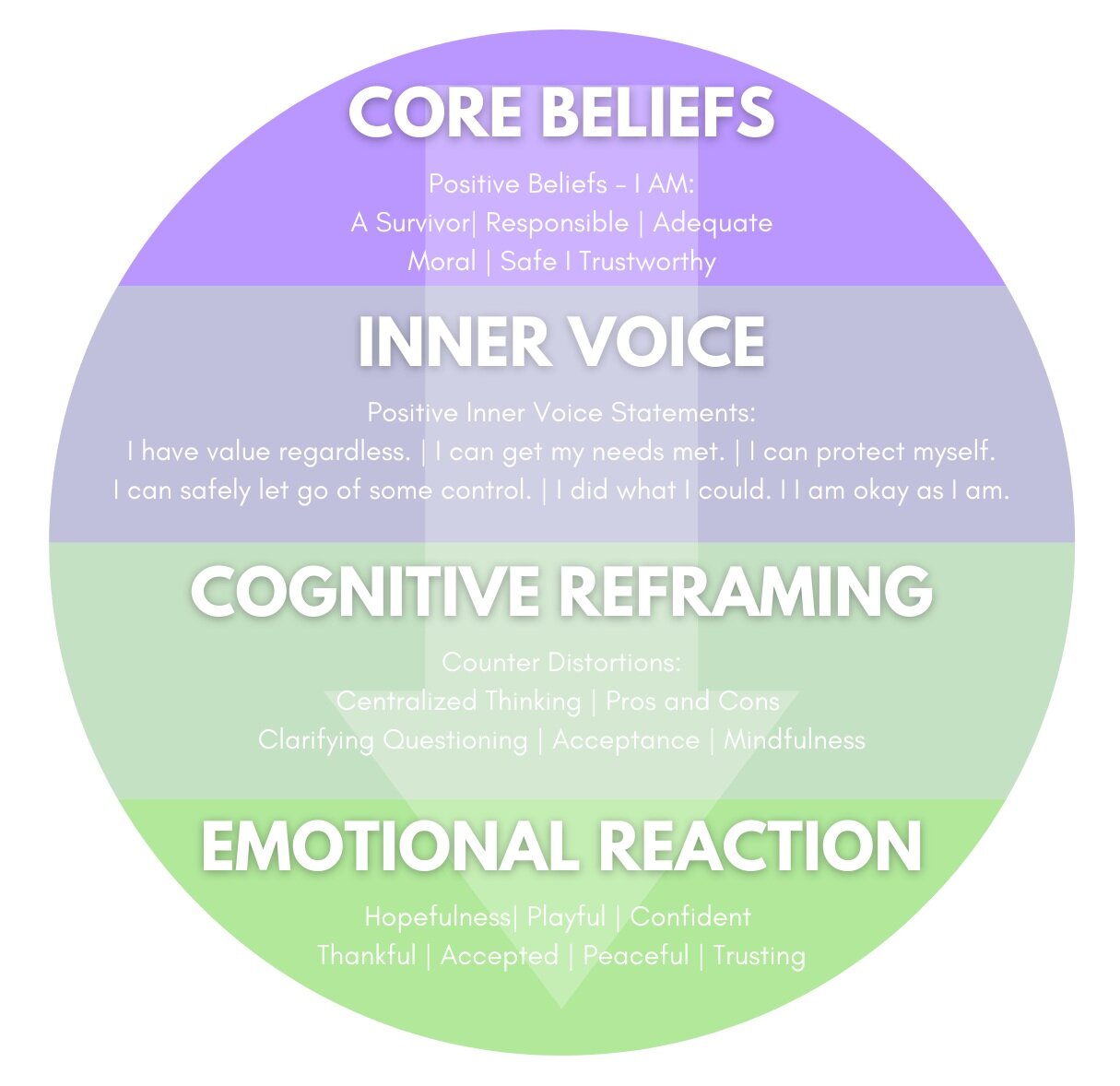
Healthy Thought Patterns
(Part I)
Module II | Session Four
Overview
M2 | Session Four: Healthy Thought Patterns (Part I)
|
Positive Core Beliefs
Developing Positive Core Belief
Limiting Core Belief Pathway
Session Skill: Core Belief Checker
Depression and You
|
Positive Core Beliefs
Positive core beliefs are assumptions we can cultivate about ourselves, the world, and others. By positively reframing old core beliefs, we can significantly shift our reality and behaviors. With practice, many of our problems with our moods can drastically change, thus transforming our lived experience.

Developing Positive Core Beliefs
New Core Beliefs
When developing a new core belief, it is important not to resist the old belief.
Instead, you want to aim for something that is more positive, balanced, and realistic.
Think of something that is a more accurate reflection of yourself.
It is important that the work you do on your negative core beliefs is not just about squashing the old belief, but also establishing a new desired belief.
Self Esteem
Developing balanced core beliefs is improving self-esteem and promoting a new balanced view of yourself.
It is not so much about saying what you are not (eg., “I am not stupid”); Instead it’s about saying what you are (eg., “I am capable in many ways”).
Source: CCI Centre for Clinical Interventions
Affirming Beliefs
As you challenge the negative beliefs you have been discovering, this list of new affirming beliefs are helpful replacements.
|
What other people
say about me is their
problem, not mine.
|
I am free to be ME.
|
Life isn’t perfect,
but it sure is great.
|
It’s okay to have
down days.
|
Even when I’m
struggling, I have so
much to be grateful for.
|
Every experience
is just another
important lesson.
|
Not everything
is meant to stay.
|
Being wrong is
the first step
to being right.
|
I do not need
to hold on to
what’s holding
me back.
|
My happiness
today is simply
the result of my
thinking.
|
Who I spend
quality time
with matters.
|
Drama and
judgments
are a waste of
perfect happiness.
|
Most people are
judging me far
less than it seems.
|
I can make
the world a
happier place.
|
The work
is worth it.
|
Source: Mark & Angel
Session Skill
The following beliefs are a list of adaptive beliefs that challenge stuck points in our thought patterns. Write down a list of your most bothersome thoughts lately, then run through the list identifying the positive core beliefs which can relate. When these feelings arise again, try to replace that thought with an adaptive belief. Write it down/screenshot it and make it your wallpaper and repeat it to yourself daily for a week.
ADAPTIVE BELIEFS
EXAMPLES
I’m so overwhelmed by life. Why? I can’t protect myself.
Trigger: Vulnerability | Adaptive Belief: I can get my needs met
I feel like a failure. Why? I’m so ashamed.
Trigger: Shame | Adaptive Belief: I am okay as I am.
I’m so angry. Why? I feel threatened.
Trigger: Survival | Adaptive Belief: I can get my needs met
SURVIVAL
|
I can get my needs met.
I exist and can get my needs met.
CONTROL
|
I can begin to learn when and how to express my feelings.
I have value regardless.
I can get my needs met.
I can control only what I can.
I can safely let go of some control.
SHAME
|
I can recognize appropriate responsibility.
I did what I could.
I am okay as I am.
I can accept myself.
I am good enough.
I can accept myself.
I can recognize appropriate responsibility.
GUILT
|
I can learn from my mistakes.
I did the best I could.
I can recognize what I can and cannot control.
I can control what I can.
I did what I could.
VULNERABILITY
|
I can protect myself.
I can control what I can.
TRAUMA
|
I can learn how to trust my judgment.
I survived.
I can survive.
I can get through it.
